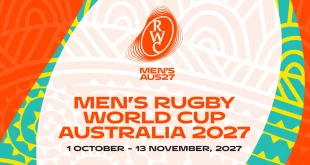International competition kicked-off today in Europe for 2020. While most eyes were on the Six Nations matches, there were also round one fixtures in the Rugby Europe Championship.
Two of the five matches played today were Six Nations fixtures. Wales defeated Italy 42-0 in Cardiff, while Ireland were 19-12 winners over Scotland in Dublin. Due the the gulf between the Wales and Italy, neither side won or lost points based on the outcome of their match. However, Ireland’s win will see them with a 0.18 point gain over Scotland when the rankings are updated on Monday.
It is a different story in the Rugby Europe Championship. All three winning teams gained points and this has implications for teams ranked 13th to 24th in the world rankings. Los Leones’ 31-12 away over Russia means Spain will move further above the USA, closing the gap on Samoa who occupy 15th in the rankings.
For Russia, their home loss represents a loss of 1.19 points. What this means is that Russia remain in 20th position, but are 0.67 points above the 21st placed Hong Kong. Above Russia is Romania who were beaten 41-13 today by Georgia in Tblissi. That outcome sees Georgia trading 13th and 14th placings, in the world rankings, with Tonga.
In Lisbon, Portugal’s 23-17 home win over Belgium gives them a rise of 0.17 points. This sees the Portuguese overtaking both Canada and Namibia. The match was Portugal’s first game back in the division after defeating Germany in promotion / relegation.
Germany’s relegation follows a period of growth that included reaching the RWC 2019 Repechage tournament. In it the Germans defeated Kenya 43-6; and Hong Kong 26-9; but were beaten 29-10 by Canada. These results are inconsistent with the current world rankings and this is not a coincidence.
Today Germany are ranked 28th in the world, while Hong Kong are 21st. This reality, combined with Hong Kong’s positioning in relation to Canada and Namibia is of note. In simple terms the test match results demonstrate a flaw because it shows that Hong Kong are artificially high. Their ranking cannot be taken at face value.
Consider not only Hong Kong’s losses to Germany and Canada in RWC repechage, but also their 2019 performances. Hong Kong picked up wins over South Korea and Malaysia, teams ranked 30th and 44th in the world. In the four matches, Hong Kong won most matches convincingly, albeit they were pushed by Malaysia in losing 30–24 at home.
Canada has annual matches against the higher ranked Uruguay and USA in the ARC and also plays June (now July) and November Internationals against RWC participants. Hong Kong has never played in a RWC and nor have Malaysia or South Korea.
To put this into perspective, what it means is that if a team only faces lower ranked opponents it can nonetheless gain points. Imagine if Argentina were to leave the Rugby Championship and only play in the ARC every year; host Fiji, Italy, Scotland and Japan every July; and avoid France and the Home Unions in November. It would be a high probability of rising with a low risk of falling.
World Rugby needs to address the flaw, yet the organization has dug itself a hole. The announcement that the rankings following the November Internationals will determine the seeding for RWC 2023 means that they cannot change the rankings now. It would be controversial to do so before the RWC 2023 draw.
World Rugby Rankings: Monday, February 03, 2020:
| RANKING | COUNTRY | POINTS |
| 13 | Georgia | 71.63 |
| 14 | Tonga | 71.44 |
| 15 | Samoa | 70.72 |
| 16 | Spain | 69.35 |
| 17 | USA | 68.10 |
| 18 | Uruguay | 67.41 |
| 19 | Romania | 66.33 |
| 20 | Russia | 61.90 |
| 21 | Hong Kong | 61.23 |
| 22 | Portugal | 61.18 |
| 23 | Canada | 61.12 |
| 24 | Namibia | 61.01 |
| 25 | Netherlands | 60.08 |
| 26 | Brazil | 58.89 |
| 27 | Belgium | 55.57 |
 Americas Rugby News Rugby news from across the Americas!
Americas Rugby News Rugby news from across the Americas!




